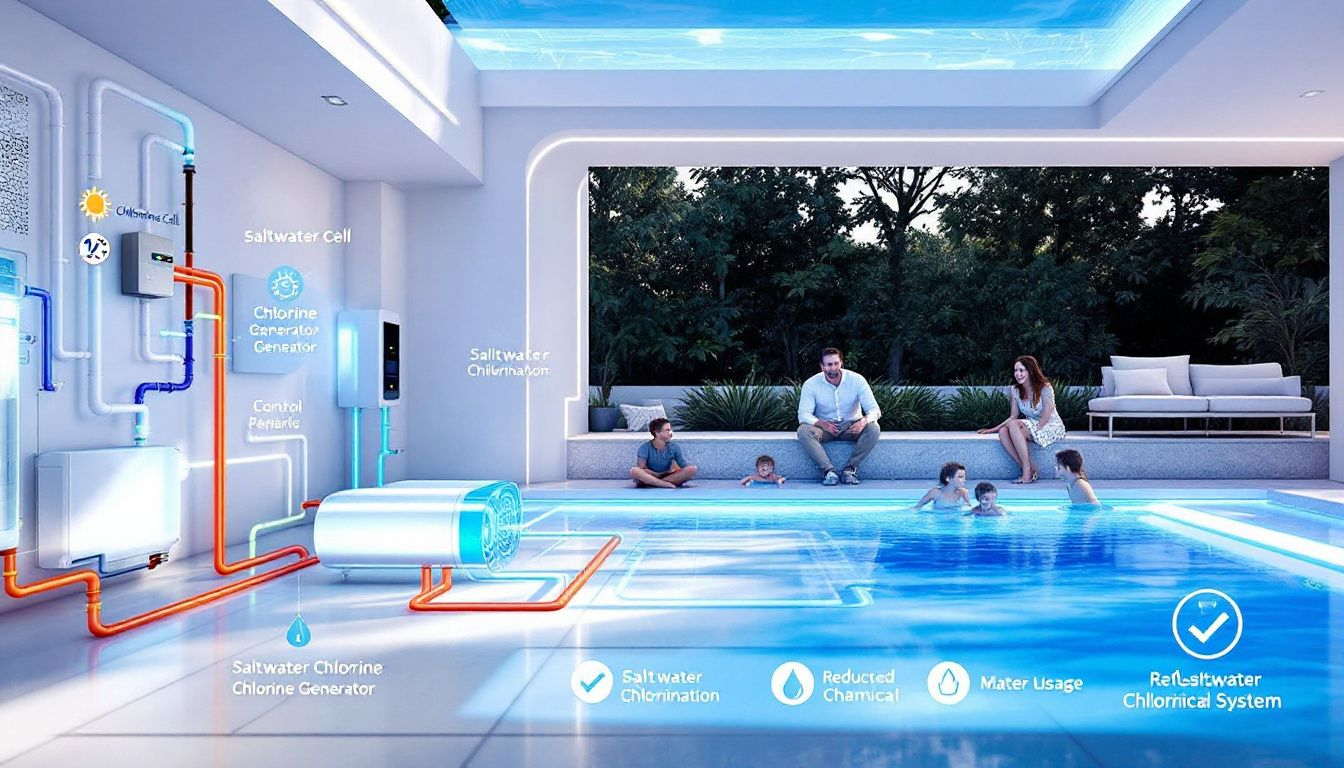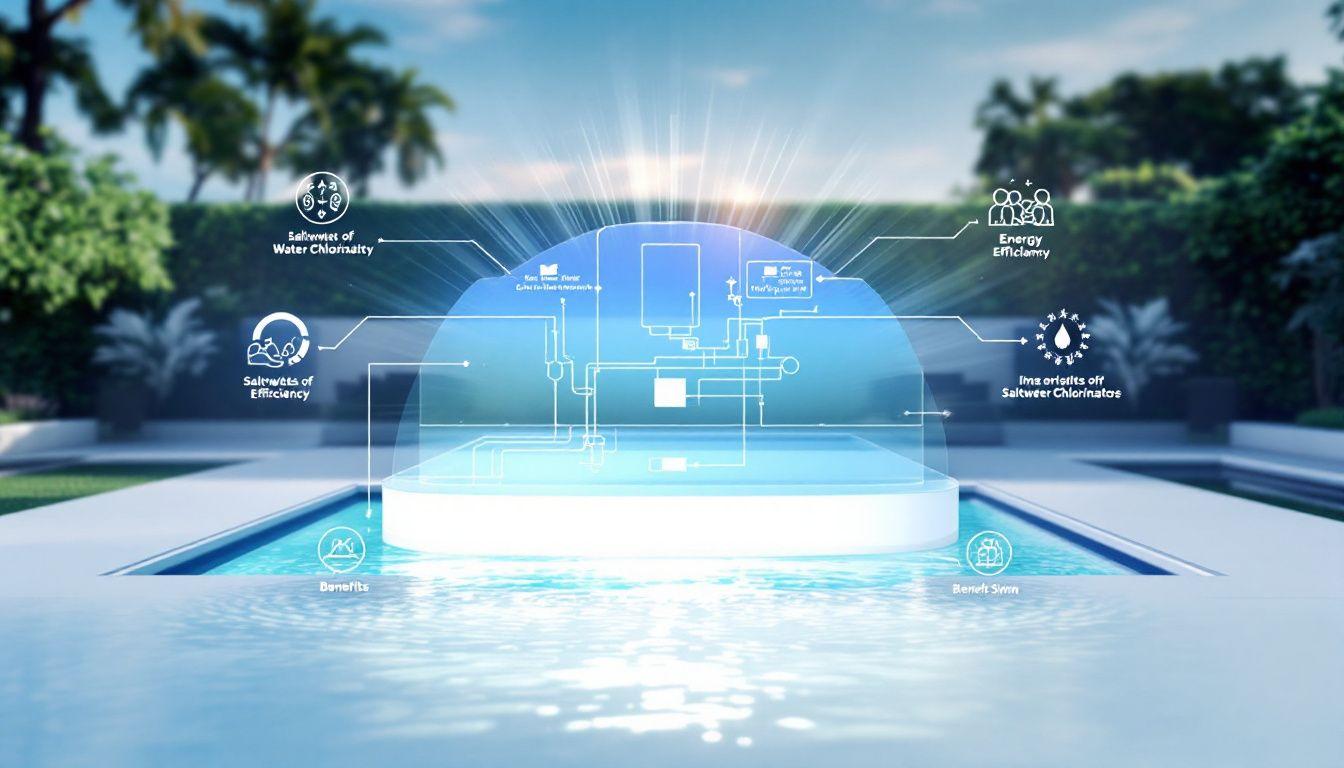
The Top Advantages of Saltwater Chlorination Technology for Residential Swimming Pools
Key Takeaways
Saltwater chlorination technology uses electrolysis to convert salt into chlorine, ensuring consistent and reliable pool sanitization.
Saltwater pools significantly reduce chlorine smell and irritation, providing a more pleasant swimming experience for all users.
Despite higher initial costs, saltwater systems offer long-term savings through lower maintenance needs and reduced chemical purchases.
Understanding Saltwater Chlorination Technology

Saltwater chlorination technology is a sophisticated system that converts dissolved salt into chlorine gas to sanitize pool water. This is achieved through a process called electrolysis, where a salt chlorine generator utilizes table salt (sodium chloride) to produce chlorine. The result is a consistent and reliable method of keeping your pool clean and safe.
Central to the system is the salt chlorine generator, consisting of a salt cell and a control board. The cell has blades coated with metals like ruthenium or iridium that interact with electrically charged titanium plates to convert salt to chlorine. This pure chlorine gas ensures effective water sanitation.
The electrolysis process generates active chlorine for water disinfection and produces fewer chloramines, enhancing the swimming experience. Grasping this technology reveals its numerous advantages over traditional chlorine pools.
Consistent and Reliable Sanitization
One of the standout features of salt chlorination is its ability to provide consistent and reliable sanitization. Unlike traditional chlorine pools, which can experience fluctuations in chlorine levels, traditional chlorine pool salt chlorine generators and salt chlorinators continuously convert salt into chlorine, maintaining a steady level of sanitization. This consistency helps prevent the growth of algae and ensures your pool is always ready for a swim.
These systems alert users when salt levels are low to maintain optimal performance and water balance. This makes saltwater pools a more convenient and reliable natural sanitization method, reducing the need for constant manual oversight.
Reduced Chlorine Smell and Irritation

One of the most appreciated benefits of saltwater pools is the significant reduction in chlorine smell and irritation. Traditional chlorine pools are notorious for their harsh chemical odors and the irritation they cause to skin and eyes. Saltwater systems, however, generate chlorine through electrolysis, producing significantly fewer chloramines, which are the culprits behind these issues.
With lower chloramine levels, swimmers enjoy a more pleasant and healthful experience without intense chlorine odor. The softer water is less likely to cause itchy skin and red eyes, making it ideal for sensitive individuals.
The absence of harsh chemical odors and irritations enhances the swimming experience. Swimmers can dive in without concerns about skin or eye irritation, enjoying a more comfortable and inviting pool environment.
Lower Maintenance Requirements
Maintaining a saltwater pool is generally less demanding than traditional chlorine pools. Salt chlorine generators help avoid the need for frequent manual chlorination, reducing the risk of algae growth and ensuring consistent chlorine production. While these systems do require regular maintenance, such as balancing pH and alkaline levels, they eliminate the need to purchase and handle large quantities of chlorine.
Advanced systems can automatically monitor and adjust water cleanliness, further reducing manual intervention. Basic tasks like skimming and vacuuming remain necessary, but the overall maintenance effort is significantly lower than traditional pool equipment.
Cost-Effective Over Time
While saltwater pools generally require a higher initial investment, including costs for the specialized generator and salt, these costs can lead to long-term benefits. The reduced need for chemical treatments means lower ongoing operational costs, leading to significant savings over time.
While the initial costs for saltwater pools may be higher, long-term savings in maintenance and chemical purchases make them a cost-effective option for homeowners seeking efficiency and sustainability.
Enhanced Swimming Experience
Saltwater pools produce a truly enhanced swimming pool experience. The water in these salt water pool is silky-smooth and luxuriously soft, providing a pleasant and healthful swimming environment. This is due to the lower concentration of chlorine and the absence of harsh chemical effects.
Swimwear lasts longer because the water does not strip colors or cause fading, adding to swimmers’ enjoyment. Additionally, fewer chloramines mean less skin irritation and unpleasant odors, making each swim refreshing and enjoyable.
The salt concentration in these pools is gentle and significantly lower than ocean water, making it safe and comfortable for all ages. This combination of benefits creates a superior swimming experience unmatched by traditional chlorine pools.
Environmental Benefits

Saltwater pools are not only beneficial for swimmers but also for the environment. The salt system in these pools typically requires less frequent water changes, contributing to water conservation. This is a significant advantage in regions where water is a precious resource.
Runoff from saltwater pools contains fewer harmful chemicals compared to traditional chlorinated pools, benefiting local ecosystems. Despite requiring energy for chlorine generators, reduced chemical usage often results in a smaller environmental footprint, making them a sustainable choice for eco-conscious homeowners.
Compatibility with Different Pool Types
Saltwater chlorination systems are compatible with various types of residential pools, but each type has its specific considerations. Fiberglass pools are highly suitable for saltwater systems, providing minimal risk of corrosion. This makes them a popular choice for many homeowners.
Vinyl-lined pools, on the other hand, require caution due to the potential corrosion of metal components. Concrete or gunite pools may experience abrasion from saltwater, particularly if they have plaster surfaces. It’s essential to consider these factors when deciding to transition to a saltwater system.
The size of your pool is also important. Ensuring the chlorinator can manage the water volume is crucial for optimal performance. Understanding these factors helps pool owners make informed decisions about integrating saltwater systems.
Addressing Common Misconceptions
Many people mistakenly believe saltwater pools are chlorine-free. In reality, they produce chlorine through electrolysis, so they are not chlorine-free. This misunderstanding often confuses potential pool owners.
While often perceived as better for the skin, saltwater still produces chlorine, and its effects can vary. Understanding how saltwater chlorination works is essential for making an informed decision about its suitability for your pool.
Choosing the Right Salt Chlorinator

Selecting the right salt chlorinator ensures optimal performance and compatibility with your pool setup. Consider family needs, lifestyle, pool materials, and landscaping choices to find a chlorinator that meets your specific needs and enhances your swimming experience.
Ensuring the chlorinator is compatible with your pool’s flow rate is also crucial for efficient operation and system longevity. Considering these factors will help you select a chlorinator that enhances your pool experience.
Making an informed choice involves understanding the technology and matching it to your pool’s unique requirements. This will ensure that you enjoy all the benefits of saltwater chlorination without any of the drawbacks.
Summary
Saltwater chlorination technology offers numerous advantages over traditional chlorine pools. From consistent sanitization and reduced maintenance to an enhanced swimming experience and environmental benefits, saltwater pools are a smart and sustainable choice. Understanding how this technology works and its benefits can help homeowners make informed decisions about their pool systems.
As you consider upgrading to a saltwater pool, remember the long-term cost savings, environmental benefits, and improved swimming experience. Embracing saltwater chlorination technology is a step towards a healthier, more enjoyable, and eco-friendly pool environment.
Frequently Asked Questions
Are saltwater pools completely chlorine-free?
Saltwater pools are not completely chlorine-free, as they generate chlorine through a process called electrolysis. This means they still have some level of chlorine present.
Do saltwater pools require less maintenance than traditional chlorine pools?
Saltwater pools typically require less maintenance than traditional chlorine pools since the salt chlorine generators produce chlorine automatically, reducing the frequency of manual chlorination. This makes them a convenient option for pool owners.
How does the initial cost of a saltwater pool compare to a traditional chlorine pool?
The initial cost of a saltwater pool is generally higher than that of a traditional chlorine pool due to the expense of the generator and salt. However, it can be more cost-effective in the long run due to lower maintenance and chemical costs.
Can saltwater chlorination systems be used with all types of pools?
Saltwater chlorination systems can be used with most pool types, but it's important to consider compatibility, particularly with vinyl-lined and concrete pools, which may require additional precautions to prevent damage.
What are the environmental benefits of saltwater pools?
Saltwater pools offer significant environmental benefits by conserving water and minimizing harmful chemical runoff, which helps reduce their overall environmental impact.

